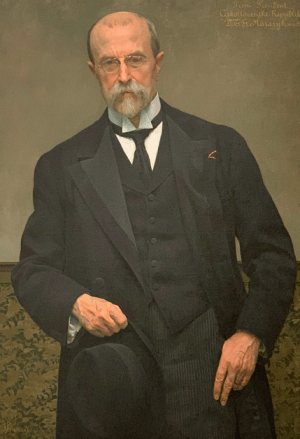6.12.1916 Masaryk sentenced to death
Categories: Personalities , First World War , Calendar
 Kramář, Rašín and some others were sentenced to death for treason. A year after them, Masaryk himself was sentenced in absentia. He was granted amnesty in 1917.
Kramář, Rašín and some others were sentenced to death for treason. A year after them, Masaryk himself was sentenced in absentia. He was granted amnesty in 1917.
The Austrian secret police referred to the "Mafia" (the main organ of the Czech domestic resistance during the First World War) knew about it, but never managed to uncover its entire network and thus break it for good. The police and military intelligence therefore preferred to focus on the visible representatives of Czech political life, whom they assumedthat they might have contacts with foreign countries and especially with Masaryk, against whom a fugitive trial had long been prepared.
On 21 May 1915, Karel Kramář and the chairman of the Czech Sokol Society, Josef Schneiner, were arrested in Prague. A number of other collaborators followed. In November 1915, Masaryk's daughter Alice and Benes' wife Hana were also interpreted.
Beneš himself saved himself by fleeing to Switzerland. Only Přemysl Šámal remained at large, who gradually managed to partially restore the intelligence network of the "Mafia", but also the political leadership of the resistance.
"The trial, which was to demonstrate the disloyalty of the Czech political leaders politically, was opened on 6 December 1915 and was held with the exclusion of the public. The trial was actually secret, in a way this is strange, because in that case the political purpose of the trial could hardly have been fulfilledof the trial, namely the public exposure of the Czech traitors," writes Jan Rychlík in his book 1918 The Dissolution of Austria-Hungary and the Establishment of Czechoslovakia.
Although today we know that Rašín and Kramář were indeed involved in the resistance, in 1915 the prosecution had no direct evidence of this and the Austrian authorities - ourfortunately for Kramar - knew nothing about his memorandum to the Russian Foreign Minister about the establishment of the Russian Empire shortly before the war. The prosecution then presented as evidence primarily Kramář's and Rashin's pre-war political activities.
Kramář , Rašín and some others were eventually sentenced to deathfor treason. In their case, however, the execution of the sentence was delayed and the changed situation after the death of Emperor Franz Joseph in 1916 no longer allowed the sentence to be carried out. A year later, when the trial of Kramář and Co. began, Masaryk himself was sentenced to death in absentia in Vienna on 6 December 1916. For treason. It was not until 1917 that he was granted amnesty.
Sources.
The article is included in categories: